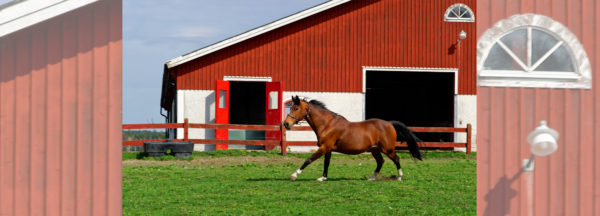Gastric Ulcers

By Standlee Premium Western Forage
What are they?
Equine gastric ulcers are caused because gastric acid (hydrochloric acid secreted by parts of the stomach lining), and, to a lesser degree, the digestive enzyme pepsin, irritates the lining of the stomach, causing ulceration. Gastric ulcers are common in horses. Their prevalence has been estimated to be from 50% to 90%, depending on the athletic activity of the horse.
What are the symptoms?
The clinical signs of ulcers are not noticeable in most horses. Of those horses clinically affected, the signs may include poor athletic performance, change in attitude, dull coat, altered eating behavior, weight loss, diarrhea and colic. In foals, teeth grinding (a sign of pain) and excessive salivation are common. Ulcers also occur in the first part of the small intestine (duodenum) and in the esophagus.
What are the causes?
Ulcers are caused by a variety of factors including: diet and feeding management:
- Feeding high levels of concentrates
- Feed deprivation and types of feeds (timothy vs. alfalfa, alfalfa is known to have acid buffering abilities)
- Stress of training or disease
- Mechanics of training (splashing of acid in stomach while exercising)
- Medications, such as corticosteroids
Diagnosis:
The only way to definitively diagnose ulcers is through gastric endoscopy, or gastroscopy, which involves placing an endoscope into the stomach and looking at its surface. This procedure is relatively easy to perform and minimally invasive. Horses are typically fasted for 12 hours prior to the exam and water is withheld for 4 hours.
Feeding and Management:
The treatment of stomach ulcers involves a combination of changes to feeding management, medical therapy, as well as reducing stress on the horse. Turnout onto green grass pasture along with altering the feeding regimen is likely the fastest method to allow the ulcers to heal. If concentrates are to be fed, they should be fed in small amounts at frequent intervals. Adding alfalfa to the diet will also help by buffering stomach acid.
By nature, horses are grazing animals, spending much of their day feeding. The grazing horse has a constant flow of saliva and passage of grass into the stomach, buffering stomach acid. If the horse must be stalled, arrange for the horse to see the horses he socializes with. Consider offering a ball or other object that the horse can enjoy in his stall. Feed the horse more frequently to help buffer the acid in the stomach. Decrease grains in your horse’s diet that are prone to promote the formation of volatile fatty acids (these are the high carbohydrate grains such as corn). Incorporate fat supplements to increase calories without excess grain. Medications that decrease stomach acid production are available, but are only necessary in horses showing signs of clinical diseases or when the predisposing factors, such as stress, cannot be removed.
Standlee Forage Alfalfa products are ideal to add to the diet of a horse with Gastric ulcers. Check out some great forage options to keep your horse supplied with a balanced diet at standleeforage.com.
